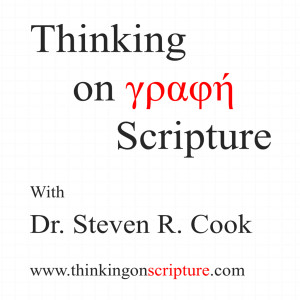
Thinking on Scripture with Dr. Steven R. Cook
Religion & Spirituality:Christianity
Eternal Life
John wrote, “whoever believes will in Him have eternal life” (John 3:15), and “God so loved the world, that He gave His only begotten Son, that whoever believes in Him shall not perish, but have eternal life” (John 3:16). And Jesus pointed others to Himself, saying, “For this is the will of My Father, that everyone who beholds the Son and believes in Him will have eternal life, and I Myself will raise him up on the last day” (John 6:40), and “Truly, truly, I say to you, he who believes has eternal life” (John 6:47; cf., 10:28). Jesus, when saying the believer “has” eternal life in John 6:47, used the Greek verb echō (ἔχω – to have or possess), which is in the present tense, meaning it’s a right-now-truth. That is, eternal life is what the believer possesses at the moment of faith in Christ. This eternal life is connected with being in a relationship with Jesus Christ. John wrote, “God has given us eternal life, and this life is in His Son. He who has the Son has the life; he who does not have the Son of God does not have the life” (1 John 5:11-12).
We should also understand that eternal life does not merely refer to our unending existence in which we spend eternity with God in heaven, but that there’s a qualitative dimension to it. Jesus said, “I came that they may have life, and have it abundantly” (John 10:10), and “This is eternal life, that they may know You, the only true God, and Jesus Christ whom You have sent” (John 17:3). Merrill C. Tenney states, “Eternal, the new life God gives, refers not solely to the duration of existence but also to the quality of life as contrasted with futility. It is a deepening and growing experience. It can never be exhausted in any measurable span of time, but it introduces a totally new quality of life.”[1] In its entirety, eternal life is a free gift offered by God to those who trust in Christ as Savior (John 3:16; Eph 2:8-9), an experience to be enjoyed now (John 10:10), and a future reward for a life of sacrifice (Luke 18:29-30). As we advance spiritually in our walk with the Lord by learning His Word (2 Tim 2:15; 3:16-17; 1 Pet 2:2; 2 Pet 3:18), being filled with the Spirit (Eph 5:18), walking obediently by faith (2 Cor 5:7; Heb 10:38; 11:6), praying often (Eph 6:18; 1 Th 5:17), developing an attitude of gratitude (Eph 5:20; 1 Th 5:18), fellowshipping with other believers (Acts 2:42; Heb 10:25), engaging in worship (Eph 5:19; Heb 13:15), and allowing trials to shape us spiritually (Jam 1:2-4), we will experience what Paul told Timothy, when he instructed him to “take hold of the eternal life to which you were called” (1 Tim 6:12). This is the quality of life of believers who, in time, operate with positive volition toward God as their divine Parent and obey His directives to advance to spiritual maturity. Wiersbe notes, “We have ‘eternal life’ and need to take hold of it and let it work in our experience.”[2] MacDonald adds, “He is to lay hold on eternal life. This does not mean that he is to strive for salvation. That is already his possession. But here the thought is to live out in daily practice the eternal life which was already his.”[3] Joseph Dillow states:
- "Possessing eternal life is one thing in the sense of initial entrance, but “taking hold” of it is another. The former is static; the latter is dynamic. The former depends on God; the latter depends on us. The former comes through faith alone; “taking hold” requires faith plus “keeping commandments” (1 Timothy 6:14). Those who are rich in this world and who give generously “will lay up treasure for themselves as a firm foundation for the coming age, so that they may take hold of the life that is truly life” (1 Timothy 6:19). Eternal life is not only the gift of regeneration; it is also “true life” that is cultivated by faith and acts of obedience."[4]
Expiation
The doctrine of expiation is closely related to propitiation. Propitiation means satisfaction and refers to God the Father’s approval of the death of Christ on behalf of sinners. Expiation emphasizes the removal of sin, as well as its guilt and punishment. Because God is holy and just, sin is an offense that demands His punishment. According to John Stott, God’s wrath refers to “His steady, unrelenting, unremitting, uncompromising antagonism to evil in all its forms and manifestations.”[5] By means of the penal substitutionary atoning death of Jesus, God’s wrath is satisfied concerning His righteous demands for our sin, and when we turn to Christ as Savior, all our sins are forgiven (Eph 1:7), and we are reconciled to God (Rom 5:10; 2 Cor 5:18-20). Jesus is “the Lamb of God who takes away the sin of the world!” (John 1:29), and we know “He appeared in order to take away sins” (1 John 3:5), and that Jesus “released us from our sins by His blood” (Rev 1:5). Bruce Demarest states, “the focus of propitiation is Godward—Christ’s sacrifice pays the penalty of sin so as to appease God’s wrath. But the focus of expiation is humanward—Christ’s sacrifice removes the stain of sin and the sinner’s liability to suffer sin’s punishment.”[6] Charles Hodge adds, “Expiation and propitiation are correlative terms. The sinner, or his guilt is expiated; God, or justice, is propitiated.”[7]
Propitiation is a word that speaks to our relationship with the Father. He was angry with us prior to our coming to Jesus, as we were “enemies” of God (Rom 5:10), spiritually “dead” in our trespasses (Eph 2:1; cf., Col 2:13), and “children of wrath” (Eph 2:3). But now, because of the death of Christ, the Father accepts those who have trusted in Jesus as Savior, and has “forgiven us all our transgressions, having canceled out the certificate of debt consisting of decrees against us, which was hostile to us; and He has taken it out of the way, having nailed it to the cross” (Col 2:13b-14). Robert B. Thieme, Jr. states:
- "Expiation describes the work of Christ on the cross that canceled mankind’s debt owed for the penalty of sin. Man’s penalty for sin is spiritual death, total separation from God. This is the status of every human being at birth due to Adam’s fall (Rom 6:23a; Eph 2:1). The penalty placed all fallen humanity hopelessly in debt to God and incapable of paying the obligation. The only one qualified to pay was Jesus Christ, the Lamb without sin. He “bore our sins in His body on the cross” and was judged by God the Father (1 Pet 2:24a; cf. Isa 53:6b). Jesus Christ Himself covered the cost of man’s spiritual death and “canceled out the certificate of debt” (Col 2:14). As a result, every human being is released from obligation and free to accept or reject the grace gift of salvation."[8]
Dr. Steven R. Cook
[1] Merrill C. Tenney, “John,” in The Expositor’s Bible Commentary: John and Acts, ed. Frank E. Gaebelein, vol. 9 (Grand Rapids, MI: Zondervan Publishing House, 1981), 50.
[2] Warren W. Wiersbe, The Bible Exposition Commentary, vol. 2 (Wheaton, IL: Victor Books, 1996), 236.
[3] William MacDonald, Believer’s Bible Commentary: Old and New Testaments, ed. Arthur Farstad (Nashville: Thomas Nelson, 1995), 2101.
[4] Joseph C. Dillow, Final Destiny: The Future Reign of the Servant Kings, 4th Edition (Houston, TX: Grace Theology Press, 2018).
[5] John R. W. Stott, The Cross of Christ (Downers Grove, IL: IVP Books, 2006), 171.
[6] Bruce A. Demarest, The Cross and Salvation: The Doctrine of Salvation, Foundations of Evangelical Theology (Wheaton, IL: Crossway Books, 1997), 180.
[7] Charles Hodge, Systematic Theology, vol. 2 (Oak Harbor, WA: Logos Research Systems, Inc., 1997), 478.
[8] Robert B. Thieme, Jr. “Expiation”, Thieme’s Bible Doctrine Dictionary, 94.
More Episodes
Jeremiah 36:1-32 - Jeremiah Commanded to Write a Scroll
 2022-04-10
2022-04-10
 48
48
Deuteronomy 23:9-18 - Keep military camps clean, treat runaway slaves justly, and no cultic prostitution
 2022-04-09
2022-04-09
 48
48
Deuteronomy 23:1-8 - Immigration Laws in Ancient Israel
 2022-04-02
2022-04-02
 42
42
Deuteronomy 22:13-30 - Sundry Laws About Marital Infidelity
 2022-03-26
2022-03-26
 47
47
Jeremiah 33:1-26 - God’s Promises of a Future for Israel and a Righteous Messiah
 2022-03-21
2022-03-21
 42
42
Deuteronomy 22:1-12 - Sundry Laws
 2022-03-19
2022-03-19
 60
60
Making a Biblical Marriage Free Audio Book
 2022-03-12
2022-03-12
 68
68
Deuteronomy 21:10-23 - War, War Brides, Disobedient Sons, and Dead Criminals
 2022-03-12
2022-03-12
 45
45
Ruth 4:1-22 Summary
 2022-03-08
2022-03-08
 42
42
Ruth 4:1-22
 2022-03-08
2022-03-08
 33
33
1 Peter 4:12-19 - Rejoicing in Trials and Suffering
 2022-03-06
2022-03-06
 55
55
Deuteronomy 21:1-9 - And Individual and Corporate Responsibility
 2022-03-05
2022-03-05
 44
44
Choosing a Righteous Life and Righteous Friends
 2022-03-05
2022-03-05
 48
48
Ruth 3:1-18 Summary
 2022-03-05
2022-03-05
 33
33
Ruth 3:1-18
 2022-03-05
2022-03-05
 31
31
Ruth 2:1-23 Summary
 2022-03-04
2022-03-04
 43
43
Ruth 2:1-23
 2022-03-04
2022-03-04
 39
39
Ruth 1:1-22
 2022-03-02
2022-03-02
 39
39
Proverbs 31 - A Woman of Excellence
 2022-02-28
2022-02-28
 49
49
Introduction to Ruth
 2022-02-28
2022-02-28
 35
35
Create your
podcast in
minutes
- Full-featured podcast site
- Unlimited storage and bandwidth
- Comprehensive podcast stats
- Distribute to Apple Podcasts, Spotify, and more
- Make money with your podcast
It is Free
You may also like

Life After Ministry


Cast The Word


Let Me Be Frank | Bishop Frank Caggiano’s Podcast | Diocese of Bridgeport, CT


The Bible Recap


The Bible in a Year (with Fr. Mike Schmitz)


- Privacy Policy
- Cookie Policy
- Terms of Use
- Consent Preferences
- Copyright © 2015-2024 Podbean.com


 iOS
iOS Android
Android